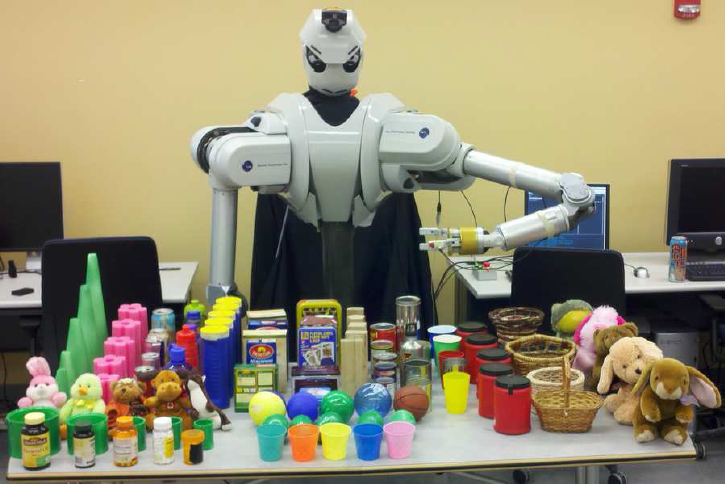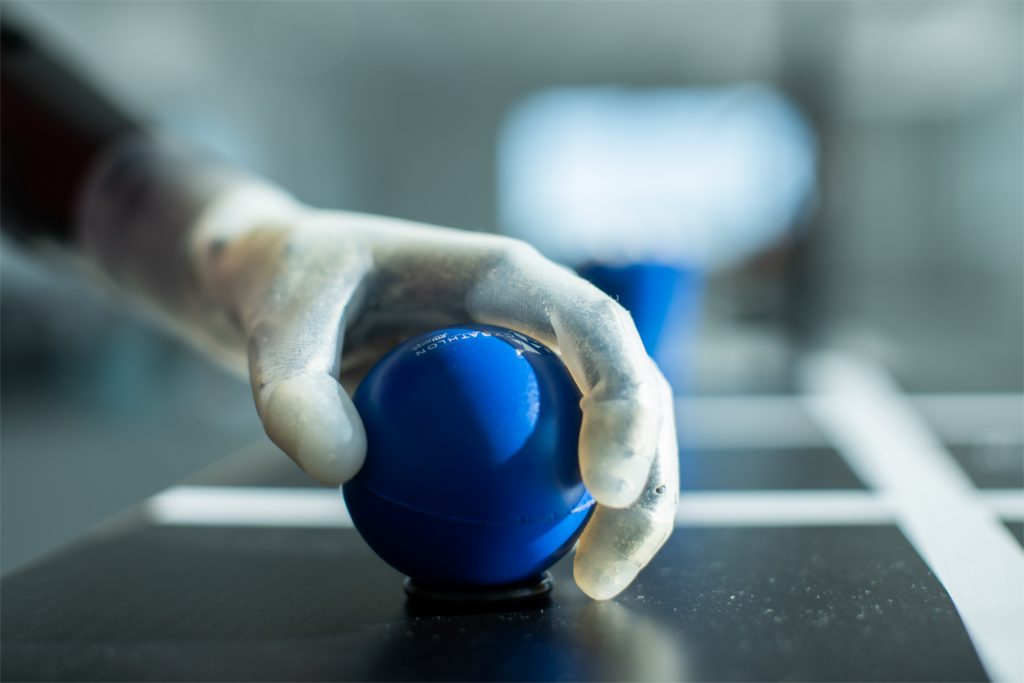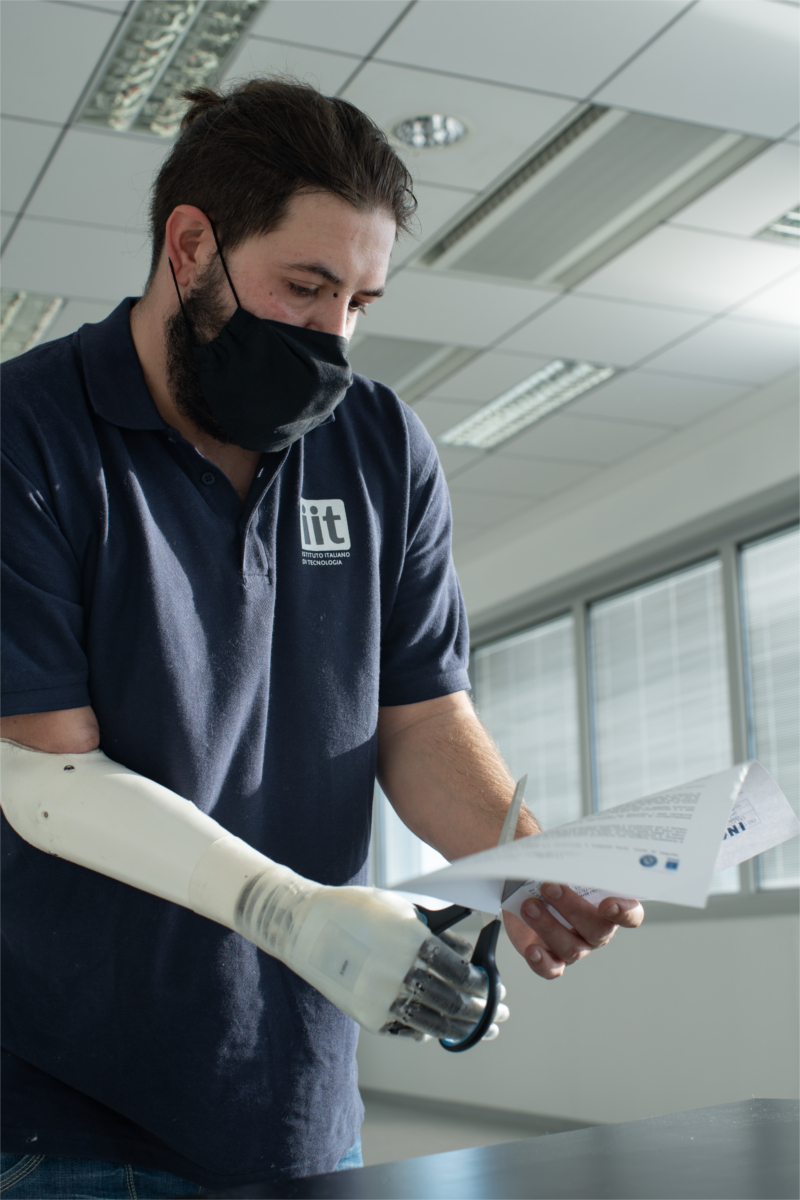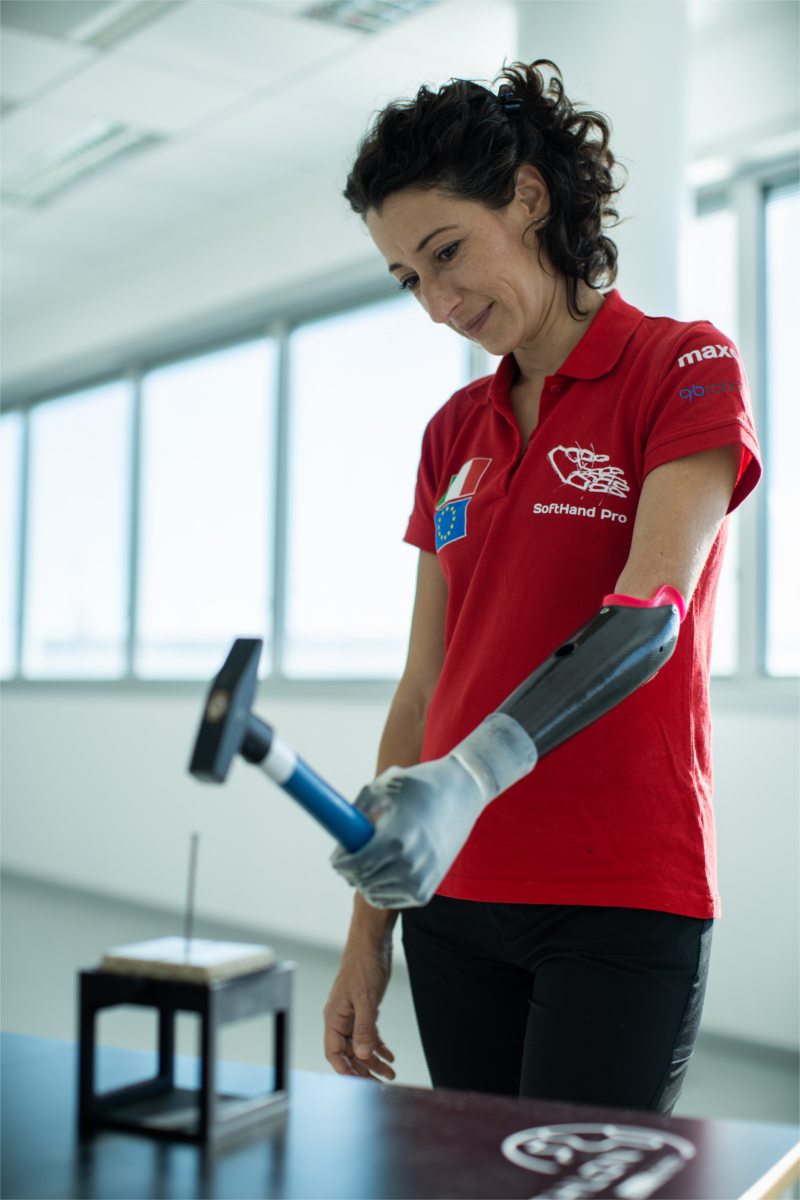Machine learning guarantees robots’ performance in unknown territory
An obstacle avoidance system for flying robots inspired by owls
Next-Generation Industrial Robotic Capabilities Advanced by Artificial Intelligence
CDC Awards $1.5 Million for Research to Reduce Exposures to Workplace Hazards through Robotic Technology
#IROS2020 Original Series: Real Roboticist

Are you curious about the people behind the robots? The 2020 IEEE/RSJ International Conference on Intelligent Robots and Systems (IROS) features a new Original Series called Real Roboticist hosted by Sabine Hauert, President of Robohub and faculty at University of Bristol.
The show looks at the people at the forefront of robotics research. How did they become roboticists? What made them proud and what challenges did they face? What advice would they give to their younger self? What does a typical day look like? And where do they see the future of robotics? If you want to find out, watch the series for free on the IROS On-Demand platform until 25 November (located under Technical Talks or at this link).
The series features the following roboticists:
- Michelle Johnson (Associate Professor of Physical Medicine and Rehabilitation at the University of Pennsylvania): Robots that Matter
- Davide Scaramuzza (Professor and Director of the Robotics and Perception Group at the University of Zürich): Drones & Magic
- Dennis Hong (Professor of Mechanical and Aerospace Engineering at the University of California Los Angeles): Making People Happy
- Ruzena Bajczy (Professor Emerita of Electrical Engineering and Computer Sciences at the University of California Berkeley): Foundations
- Peter Corke (Distinguished Professor of Robotic Vision at the Queensland University of Technology): Learning
- Radhika Nagpal (Fred Kavli Professor of Computer Science at Harvard University): Enjoying the Ride
An origami-inspired robotic fingertip with shape-morphing capabilities
Women in Robotics Update: Sarah Bergbreiter, Aude Billard, Cynthia Breazeal
In spite of the amazing contributions of women in the field of robotics, it’s still possible to attend robotics conferences or see panels that don’t have a single female face. Let alone seeing people of color represented! Civil rights activist Marian Wright Edelman said that “You can’t be what you don’t see”. Women in Robotics was formed to show that there were wonderful female role models in robotics, as well as providing an online professional network for women working in robotics and women who’d like to work in robotics. We’re facing an incredible skill shortage in the rapidly growing robotics industry, so we’d like to attract newcomers from other industries, as well as inspiring the next generation of girls. Introducing the first of our new series of Women in Robotics Updates, featuring Sarah Bergbreiter, Aude Billard and Cynthia Breazeal from our first “25 women in robotics you need to know about” list in 2013.
 |
Sarah Bergbreiter
Professor in Mechanical Engineering and Principle Investigator at the Microrobotics Lab at Carnegie Mellon University
Sarah Bergbreiter (featured 2013) as an assistant professor at the University of Maryland and acting director of Maryland Robotics Center has now moved to Carnegie Mellon University (CMU) as a full professor, expanding the frontiers of knowledge pertaining to the actuation, sensing, power, and computational aspects of making tiny robots at Microrobotics lab at CMU. She was made a 2019 Fellow in the American Society of Mechanical Engineers (ASME) for her significant and critical engineering achievements, active practice, and membership in the organization. She was the winner of the Institute of System Research’s Outstanding Faculty Award in 2017 and received the Defense University Research Instrumentation Program (DURIP) awards from the U.S. Army in 2019. She also made InStyle’s ’50 Badass Women’ list in 2019. “Inspired by Star Wars, the professor of mechanical engineering at Carnegie Mellon made her first foray into robotics at age 7 or 8. “I tried to build a robot to clean my room,” she recalls, laughing. Now she has loftier goals. Her robots, which can be smaller than an ant and up to the size of a Tic Tac, may eventually be used for microsurgery, search and rescue, and safety inspections for hard-to-reach spaces, like inside jet engines. She doesn’t envision a dystopian world where robots replace humans, however: “You want robots to complement humans.” She has more than 100 publications with almost 1500 citations and her 2014 TED talk about microrobotics has been viewed 1.68 million times. She specializes in micro/nanorobots and has brought impressive capabilities in millimeter-sized jumpers which can overcome obstacles 80x their height. She collaborates with experts from biology, neuroscience, dynamics and other fields to build agile robots with mechanosensors. |
 |
Aude Billard
Professor and Director of the Learning Algorithms and Systems Laboratory at EPFL
Aude Billard (featured 2013) is now a full professor at École Polytechnique Fédérale de Lausanne (EPFL) at the Learning Algorithms and Systems Laboratory (LASA), teaching robots to perform skills with the level of dexterity displayed by humans in similar tasks. These robots move seamlessly with smooth motions. They adapt adequately and on-the-fly to the presence of obstacles and to sudden perturbations, hence mimicking humans’ immediate response when facing unexpected and dangerous situations. Billard has been nominated for the Outstanding Women in Academia by Swiss National Science Foundation, where she is a member of the Scientific Research Council, and was also nominated to the Swiss Academy of Engineering Sciences. She is currently the vice president for publication activities of the IEEE Robotics and Automation Society, the associate editor of the International Journal of Social Robotics, elected president of the EPFL Teaching Body Assembly, and elected president of the EPFL Teachers’ Council. In 2017, Billard received a European Research Council Advanced Grant for Skill Acquisition in Humans and Robots. She is also cofounder of AICA, a young start-up from EPFL, active in the domain of artificial intelligence and robotics, which provides novel software for creating safe and flexible installations of industrial robots, with a modular approach. She specializes in building robots that can interact with, learn from, and help humans. She has also been studying the neural and cognitive processes underpinning imitation learning in humans. She has over 500 publications and more than 18000 citations, and you can watch her plenary talk at AAAI 2020 on ‘Combining Machine Learning and Control for Reactive Robots’. |
 |
Cynthia Breazeal
Professor and Associate Director at MIT Media Lab | Founder and Director of the Personal Robots Group | Founder, Chief Scientist and Chief Experience Officer at Jibo
Cynthia Breazeal (featured 2013) is currently a professor at the MIT Media Lab where she founded and directs the Personal Robots Group. She is also Associate Director of the Media Lab in charge of new strategic initiatives and spearheads MIT’s K-12 education initiative on AI. She is a leading expert in designing personal robots that naturally interact with humans and specializes in balancing AI, UX design, and understanding the psychology of engagement to design personified AI technologies that promote human flourishing and personal growth. Breazeal was recently elected as a Fellow of the AAAI Association for the Advancement of Artificial Intelligence for significant sustained contributions. She has more than 350 publications and 23000 citations, and has spoken at prominent venues such as TED, the World Economic Forum, the UN, SXSW, CES. She was recognized as a Finalist in the National Design Awards. In 2014, she received the George R. Stibitz Computer & Communications Pioneer Award for seminal contributions to the development of Social Robotics and Human Robot Interaction. Breazeal has also been recognized for her entrepreneurship. She is the Founder and Chief Scientist of Jibo, the pioneering crowdfunded social robot featured on the cover of TIME magazine’s 25 Best Inventions of 2017. Her journey with Jibo isn’t over. NTT Disruption is relaunching the robot as an enterprise product in healthcare and education. Breazeal shared her experiences in a recent IROS 2020 plenary ‘Living with Social Robots: from Research to Commercialization and Back’. Make sure you watch the extra feature ‘Jibo Succeeded by Failing’ which includes the classic goodbye. We can’t wait to see the hello. |
Want to keep reading? There are 180 more stories on our 2013 to 2020 lists. Why not nominate someone for inclusion next year!
And we encourage #womeninrobotics and women who’d like to work in robotics to join our professional network at http://womeninrobotics.org
#323: Multisensory Perception, with Jivko Sinapov

In this episode, Shihan Lu interviews Jivko Sinapov, Assistant Professor in the Computer Science Department at Tufts University, about his work on behavior-grounded multisensory perception and exploration in robotics. Dr. Sinapov discusses several perspectives on multisensory perception in robotics, including data collection, data fusion, and robot control and planning. He also shares his experience about using robotics for K-12 education.
Jivko Sinapov

Jivko Sinapov received his Ph.D. in Computer Science and Human-Computer Interaction from Iowa State University (ISU). While working toward his Ph.D. at ISU’s Developmental Robotics Lab, he developed novel methods for behavioral object exploration and multi-modal perception. He went on to be a clinical assistant professor with the Texas Institute for Discovery, Education, and Science at UT Austin and a postdoctoral associate working with Peter Stone at the Artificial Intelligence lab. Sinapov’s research interests include developmental robotics, computational perception, autonomous manipulation, and human-robot interaction.
Links
- Download mp3 (10.6 MB)
- Sinapov’s research
- Subscribe to Robohub using iTunes, RSS, or Spotify
- Support us on Patreon
Velodyne Lidar Unveils Breakthrough Solid State Sensor for Advanced Driver Assistance Systems (ADAS) and Autonomy
Two teams from Istituto Italiano di Tecnologia will compete at the Cybathlon Global Edition 2020, the Olympics dedicated to new prosthetic technologies

IIT’s teams will compete in the “Powered Arm Prosthesis” category showing two different robotic arm prostheses made in Italy: SoftHandPro and Hannes. The race course is about 30 metres long and will see the pilots compete in three races on 6 stations reproducing daily tasks. 60 teams from 23 countries will be involved in the event “remotely”, streamed on Cybathlon website starting from November 13th.
Maria Fossati interview. Credits: Istituto Italiano di Tecnologia
The IIT-Istituto Italiano di Tecnologia (Italian Institute of Technology) will participate in the Cybathlon Global Edition 2020, an international event organised by the Federal Institute of Technology (ETH) in Zurich, Switzerland, and dedicated to new prosthetic devices. People with physical disabilities from all over the world will compete, as pilots, in different disciplines that reproduce daily useful tasks, using the latest discoveries in technology such as robotic prostheses, exoskeletons and new generation wheelchairs. IIT will participate by presenting two robotic arm prostheses: the SoftHand Pro, stemming from a research project funded by the European Research Council (ERC), and the Hannes robotic hand developed together with the Italian Centro Protesi INAIL (the prosthetic unit of the National Institute for Insurance against Accidents at Work).
Cybathlon 2020 should have taken place in May at the Letzigrund Stadium in Zurich. However, this year for the first time, due to the current global health crisis, it will take place remotely in 23 countries around the world, from Genoa to Hong Kong, Cleveland to Paris and Melbourne to Tokyo. These countries will transmit their own races to the control center in Zurich where a single programming video will be created and streamed online on 13 November. The competition will be available on Cybathlon website.
The event aims to raise awareness among the general public on the needs of people living with a disability, and to showcase the state-of-the-art of technologies developed in this area also promoting collaboration between research centers.
Preparing for Cybathlon 2020 Credits: Istituto Italiano di Tecnologia
IIT will vie with two made-in-Italy robotics solutions in the “Powered Arm Prosthesis” category, lining up two different teams: Rehab Tech and SoftHand Pro. The two teams belongs to different IIT research groups, both engaged in research on the movements of the human hand and robotics. They will face competition along the same race track prepared at the IIT’s Center for Human Technologies (CHT-IIT) based in Genova (Italy).
The two teams will use two independent devices that have a common history: they were created in IIT starting from the Pisa/IIT SoftHand robotic hand technology, initially developed for humanoid robots and supported by European Research Council (ERC)’s grant.
Rehab Tech team
This team will use the biomimetic prosthetic hand Hannes, developed in the joint laboratory IIT-INAIL Rehab Technologies Lab, a Class 1 CE product which this year was awarded the Compasso d’Oro Award for design, with the goal of reaching the market in the short-term. The pilot is Colian Rossi, a technical designer who had a work accident in 2015, causing him an arm amputation. He is now an INAIL patient.

SoftHand Pro team
They will use the SoftHand Pro realized in the IIT’s Soft Robotics for Human Cooperation and Rehabilitation laboratory in collaboration with the University of Pisa. SoftHand Pro ensues from the ERC SoftHand project and it is now at the center of an ERC’s Synergy Grant (Natural Bionics) which, in future, aims to directly integrate the prosthesis with the subjects’ spinal circuits via neurosurgery. The pilot is Maria Fossati, industrial designer and IIT researcher, who constantly wears the prosthesis.

Each team consists of a pilot and her/his entourage made up of researchers having the role of coaches, athletic trainers and real race mechanics, just as in motor racing competitions.
The race course for the “Powered Arm Prosthesis” category is about 30 metres long and will see the pilots compete in three races on six stations: preparing the table for breakfast, laundry, re-setting a table, using domestic tools (hammer, scissors, etc.), recognising shapes blindly and arranging glasses in the shape of a pyramid. The race will have a maximum duration of 8 minutes. The score is assigned on the basis of the number of completed tasks and the completion time.
Competing teams in this category are 14, from Italy, Sweden, India, South Africa, Russia, Croatia, Great Britain, China, Germany and Switzerland. Teams achieving the 4 best times in their discipline will receive an award on Saturday, 14 November.
Cybathlon 2020 will have a total of 60 teams divided into 6 race disciplines, identified by the pilot’s disability and technology in use. Besides the Power Arm Prosthesis category there is: The Powered Leg Prosthesis, the Powered Exoskeleton, the Powered Wheel Chair, the Brain Computer Interface and the Functional Electrical Stimulation Bike. The event will kick off at 3pm UTC. You can read more information about it in this post and on their website.
Natalia Calvo’s talk – How children build a trust model of a social robot in the first encounter?
On Friday the 13th of November, Talking Robotics hosted an online talk with PhD student Natalia Calvo from Uppsala University in Sweden. Now you can watch the recorded seminar.

Talking Robotics is a series of virtual seminars about Robotics and its interaction with other relevant fields, such as Artificial Intelligence, Machine Learning, Design Research, Human-Robot Interaction, among others. The aim is to promote reflections, dialogues, and a place to network. Talking Robotics happens virtually and bi-weekly, i.e., every other week, allocating 30 min for presentation and 30 min for Q&A and networking. Sessions have a roundtable format where everyone is welcome to share ideas. Recordings and materials are shared in this website.
Abstract
The talk discussed several literature approaches to assess children’s trust towards robots. Calvo argues that the perceived first impression of a social robot’s likability and competence are predictors of children’s judgments of trust in social robots.
Biography
Natalia Calvo is a Ph.D. student at Uppsala University in Sweden. She obtained her master’s degree in Robotics Engineering from the University of Genoa in Italy, and her bachelor’s degree in Mechatronics Engineering from the Nueva Granada Military University in Colombia. She is part of the EU ITN ANIMATAS project. Her research focuses on modelling trust in child-robot educational interactions. Natalia is interested in implementing machine learning models for the understanding of children’s perception of trust in robots. You can read more details about the speaker on this website.